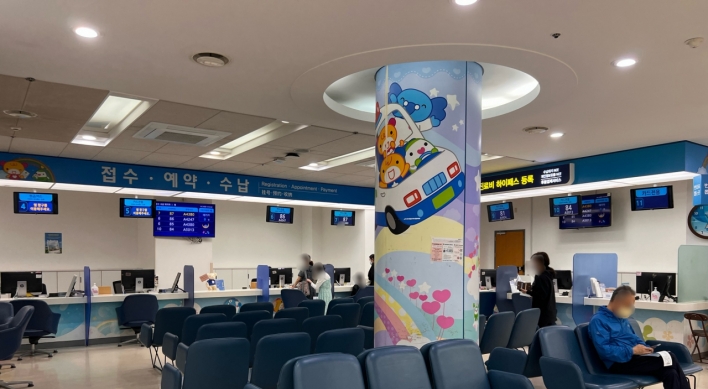[Editorial] Consumption slowdown
Citizens, firms need to spend as usual
By Korea HeraldPublished : May 9, 2014 - 21:28
The Sewol ferry tragedy is beginning to take its toll on the national economy. More than three weeks have passed since the ferry sank off the southern coast. But a deeply mournful atmosphere continues to pervade the nation, depressing consumer sentiment and impeding the recovery of private consumption.
Since April 16, the entire nation has been in mourning. Gripped with shock and sadness, many consumers have refrained from seeking pleasure through shopping, spending or drinking. They have also canceled tours, family outings and get-togethers with friends.
Corporations have also joined the mourning. They have canceled or postponed excessive advertising, noisy promotional events and showy new product releases. Some even advised their employees to refrain from drinking and playing golf.
Local governments have added to the mood by canceling more than 80 annual festivals aimed at promoting tourism to their regions. Schools around the nation have also called off annual study trips for students.
As national mourning continues, consumption is showing signs of slumping. The seven large credit card companies reported that credit sales fell by 5 percent a day on average between April 16 and 30.
Sales were also lackluster during the ensuing long holiday from May 1-6. Department stores and large discount store chains said business was not as brisk as they expected.
Economic institutes expect the Sewol ferry disaster to have a bigger impact on consumption than previous manmade tragedies in Korea, such as the collapse of Sampoong Department Store in 1995 and the Daegu subway fire in 2003.
Nomura Securities has forecast that private consumption growth would slow from 2.9 percent to 2.2 percent this year, while the Korea Institute of Finance has predicted the ferry disaster would knock up to 0.3 percentage point off the economy’s growth rate.
The nation’s economy cannot afford such a setback. The economy appears to be on a solid path to recovery. It grew 3.9 percent in the first quarter of the year, the fastest pace since the 4.9 percent growth in the first quarter of 2011.
Yet the recovery is still fragile. Facility investment declined in the first quarter while private consumption remained sluggish, posting an anemic 0.3 percent growth. The recent gains in the value of the Korean currency against the dollar threaten to slow export growth, which drove the Korean economy forward in the first quarter.
Confronted with a national disaster, it is only natural that the whole nation goes into mourning and shares its grief with the victims’ families. But if the nation lets itself be carried away by grief for too long, it would harm the economy.
Ordinary citizens need to spend as usual and companies need to return to business as usual to help the economy get back to normal. Otherwise, the nascent recovery could be dampened.
The government, for its part, should provide support to tour agencies, transportation companies, lodging businesses and other firms that have been hit hard by the ferry disaster.
Since April 16, the entire nation has been in mourning. Gripped with shock and sadness, many consumers have refrained from seeking pleasure through shopping, spending or drinking. They have also canceled tours, family outings and get-togethers with friends.
Corporations have also joined the mourning. They have canceled or postponed excessive advertising, noisy promotional events and showy new product releases. Some even advised their employees to refrain from drinking and playing golf.
Local governments have added to the mood by canceling more than 80 annual festivals aimed at promoting tourism to their regions. Schools around the nation have also called off annual study trips for students.
As national mourning continues, consumption is showing signs of slumping. The seven large credit card companies reported that credit sales fell by 5 percent a day on average between April 16 and 30.
Sales were also lackluster during the ensuing long holiday from May 1-6. Department stores and large discount store chains said business was not as brisk as they expected.
Economic institutes expect the Sewol ferry disaster to have a bigger impact on consumption than previous manmade tragedies in Korea, such as the collapse of Sampoong Department Store in 1995 and the Daegu subway fire in 2003.
Nomura Securities has forecast that private consumption growth would slow from 2.9 percent to 2.2 percent this year, while the Korea Institute of Finance has predicted the ferry disaster would knock up to 0.3 percentage point off the economy’s growth rate.
The nation’s economy cannot afford such a setback. The economy appears to be on a solid path to recovery. It grew 3.9 percent in the first quarter of the year, the fastest pace since the 4.9 percent growth in the first quarter of 2011.
Yet the recovery is still fragile. Facility investment declined in the first quarter while private consumption remained sluggish, posting an anemic 0.3 percent growth. The recent gains in the value of the Korean currency against the dollar threaten to slow export growth, which drove the Korean economy forward in the first quarter.
Confronted with a national disaster, it is only natural that the whole nation goes into mourning and shares its grief with the victims’ families. But if the nation lets itself be carried away by grief for too long, it would harm the economy.
Ordinary citizens need to spend as usual and companies need to return to business as usual to help the economy get back to normal. Otherwise, the nascent recovery could be dampened.
The government, for its part, should provide support to tour agencies, transportation companies, lodging businesses and other firms that have been hit hard by the ferry disaster.
-
Articles by Korea Herald




![[Grace Kao] Hybe vs. Ador: Inspiration, imitation and plagiarism](http://res.heraldm.com/phpwas/restmb_idxmake.php?idx=644&simg=/content/image/2024/04/28/20240428050220_0.jpg&u=)

![[Herald Interview] Mom’s Touch seeks to replicate success in Japan](http://res.heraldm.com/phpwas/restmb_idxmake.php?idx=644&simg=/content/image/2024/04/29/20240429050568_0.jpg&u=)


![[News Focus] Lee tells Yoon that he has governed without political dialogue](http://res.heraldm.com/phpwas/restmb_idxmake.php?idx=644&simg=/content/image/2024/04/29/20240429050696_0.jpg&u=20240429210658)









![[Today’s K-pop] Seventeen sets sales record with best-of album](http://res.heraldm.com/phpwas/restmb_idxmake.php?idx=642&simg=/content/image/2024/04/30/20240430050818_0.jpg&u=)